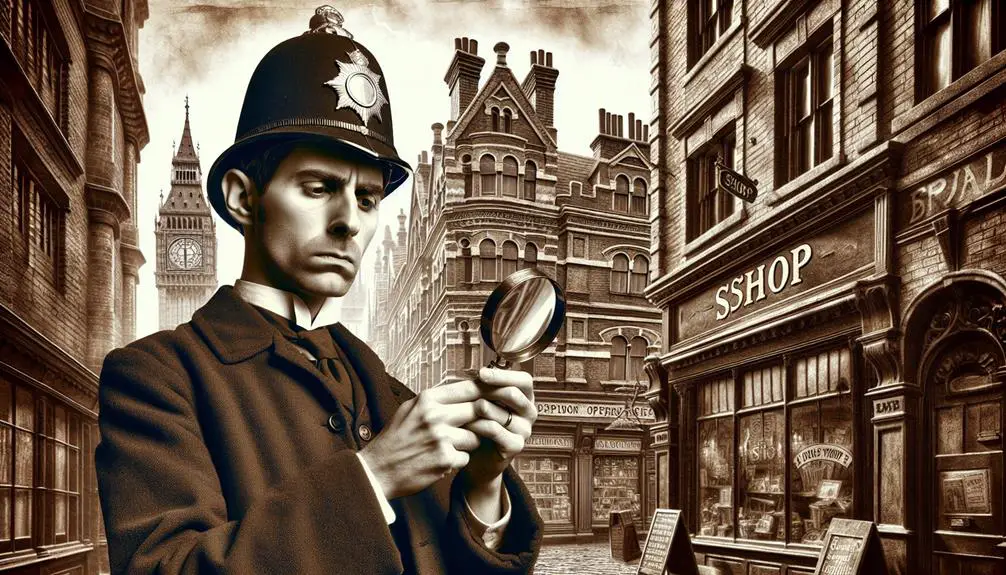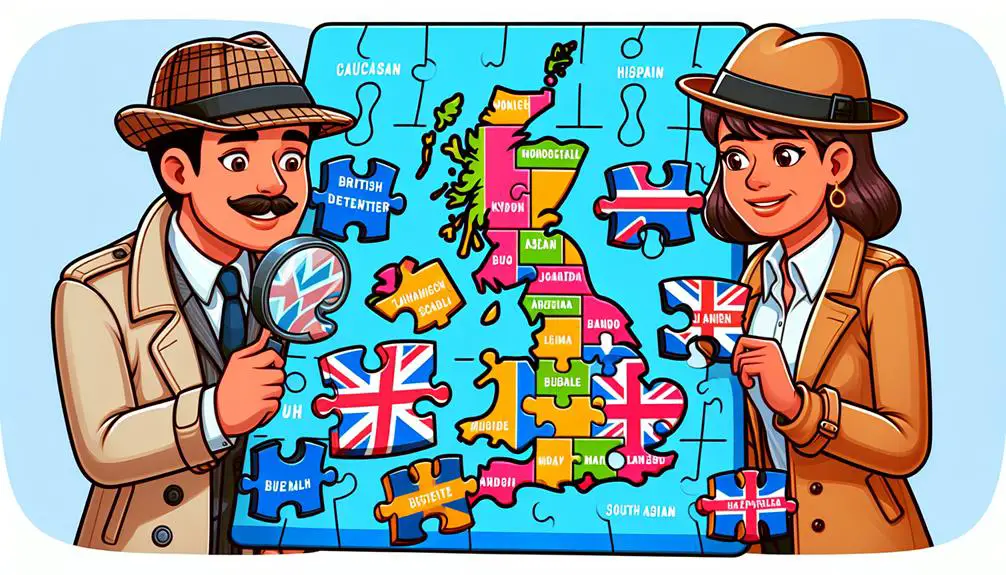Though you might think 'shopped' simply refers to visiting a store, in British slang, it's far more nuanced. When you hear someone in the UK say they've been 'shopped,' it's not about their latest retail adventure; rather, it suggests they've been reported or snitched on, often to authorities.
This term, rich in cultural context, varies in usage and interpretation, making its exploration fascinating. Understanding 'shopped' in everyday language, its origins, and how it's perceived both within and outside the UK offers insight into the dynamic nature of slang. So, let's unravel the layers behind this seemingly straightforward term, revealing its significance and impact on communication.
Origins of 'Shopped

The term 'shopped,' often used in British slang, originated from the verb 'to shop,' which historically implies presenting or revealing information, usually to authorities, in a context that diverges significantly from its conventional retail-related meaning. This deviation illustrates the linguistic flexibility and the cultural depth embedded within British slang, offering a lens through which you can examine societal attitudes towards authority and informants.
Analysing the etymology of 'shopped' reveals its roots in the act of disclosing information about someone else's illegal or suspicious activities. Traditionally, shopping someone involved a deliberate action, akin to betraying trust or breaking a code of silence within a community. This act reflects a complex interplay between loyalty, societal norms, and the perceived moral obligation to uphold the law, regardless of personal relationships.
In scholarly terms, the evolution of 'shopped' from a simple transactional verb to a slang term encapsulating the act of betrayal or revelation to authorities underscores the fluid nature of language. It also highlights the socio-linguistic mechanisms that allow words to acquire new meanings based on changes in societal values, norms, and collective experiences. The transformation of 'shopped' serves as a testament to the adaptability of language in response to shifting cultural landscapes.
You're encouraged to consider 'shopped' not merely as a term but as a reflection of societal dynamics and attitudes towards crime, loyalty, and justice. This analytical perspective uncovers the layers of meaning and socio-cultural implications embedded within a seemingly straightforward slang term, enriching your understanding of language's power to mirror and shape human experience.
Shopped' in Everyday Language
Exploring how 'shopped' permeates everyday language reveals its nuanced role beyond the realm of legal and illicit disclosures. This term, deeply embedded in British slang, has evolved to convey a variety of meanings, each reflecting the complexities of social interactions and cultural norms. You'll find 'shopped' used in contexts that stretch its original boundaries, showcasing its adaptability and relevance in everyday discourse. To understand this evolution, consider the following aspects:
- Colloquial Usage: Initially tied to the act of informing or betraying, 'shopped' now frequently appears in casual conversations to imply someone has been caught or exposed, not necessarily in a legal sense but in everyday situations where honesty or deceit comes into play.
- Metaphorical Extension: The term has transcended its literal application, embracing a metaphorical usage that denotes being outmaneuvered or bested in various scenarios—ranging from games to personal arguments, where one's actions or arguments are decisively countered or revealed.
- Social Media Influence: In the digital age, 'shopped' has adopted a new layer of meaning, often used to describe the act of being publicly called out or debunked online, especially in platforms where accountability is frequent and visible.
- Cultural Reflections: The versatility of 'shopped' mirrors broader shifts in UK societal norms, including attitudes towards privacy, trust, and the importance of transparency in relationships—both personal and public.
In dissecting the everyday use of 'shopped', you're invited to appreciate its dynamic presence in British slang, a testament to the language's ability to evolve and reflect contemporary life's intricacies.
Variations and Similar Slang

Diving into the rich tapestry of British slang, you'll discover that 'shopped' is but one thread among many, each with its unique variations and closely related expressions reflecting the nuances of the UK's vibrant linguistic culture. 'Shopped', primarily denoting the act of being reported or informed on, has siblings in slang that convey similar or related meanings, demonstrating the fluidity and adaptability of colloquial language.
One notable variation is 'grassed', a term that similarly implies the act of informing authorities about someone's wrongdoing. It carries a connotation of betrayal and is often used in contexts where loyalty is prized, encapsulating the gravity of the action within its phonetic brevity. Another term, 'snitched', parallels 'shopped' in its implication but differs slightly in its usage and perceived severity. While 'shopped' might be used in a range of contexts, from playful to serious, 'snitched' often harbors a more negative connotation, highlighting the act's clandestine or treacherous nature.
Furthermore, 'ratted out' serves as a linguistic cousin to 'shopped', sharing a thematic lineage but diverging in its connotative landscape. This variation emphasizes the traitorous element of the act, invoking imagery of disloyalty and deceit. Each of these terms, while similar in their base meaning, offers subtle shades of interpretation, reflecting the social and moral dimensions of the actions they describe.
In analyzing these variations and similar slang, it becomes clear that the lexicon of British slang isn't merely a collection of words but a complex mosaic of social interactions, attitudes, and values. The nuanced differences between these terms provide insights into the dynamics of trust, loyalty, and community within the cultural fabric of the UK.
Cultural Context and Usage
Within the cultural fabric of the UK, understanding how and when slang terms like 'shopped' are employed reveals much about societal values and interpersonal relationships. This term, which can mean to inform on someone or to be arrested, depending on the context, serves as a mirror reflecting the intricacies of British social dynamics. Here's a closer look at its cultural context and usage:
- Trust and Betrayal: The use of 'shopped' often revolves around themes of trust and betrayal within close-knit communities. Its application underscores the gravity of loyalty and the repercussions of its breach, illustrating a societal emphasis on interpersonal trust.
- Authority and Rebellion: When someone is said to have been 'shopped' to the authorities, it highlights a dichotomy between conforming to societal norms and rebelling against them. This duality is a critical component of British cultural narratives, showcasing an ongoing negotiation between individual freedoms and collective responsibilities.
- Social Control: The term also functions as a mechanism of social control, serving as a deterrent against undesirable behavior. It embodies the idea that community members play a role in maintaining order, reflecting a societal preference for self-regulation over external enforcement.
- Language as a Social Tool: Finally, the use of 'shopped' and similar slang exemplifies how language acts as a social tool, enabling individuals to navigate complex social landscapes. It allows for the expression of nuanced social concepts and relationships that might otherwise be difficult to articulate.
Analyzing the usage of 'shopped' within these contexts offers a window into the values, tensions, and dynamics that underpin British society, revealing the power of slang as a reflection of cultural identity.
Misinterpretations Abroad

When British slang like 'shopped' crosses borders, it often encounters misinterpretations that can significantly alter its intended meaning and impact. You'll find that the richness of British slang, with its deep-rooted cultural connotations, mightn't translate well in different linguistic landscapes. This discrepancy stems primarily from the lack of equivalent expressions or cultural references, leading to confusion or even complete misunderstanding among non-native speakers.
In the case of 'shopped', which in British contexts can imply being caught or informed on, especially in legal or illicit scenarios, the term's reception abroad can diverge notably. In countries where direct translations don't capture the nuanced implications of betrayal or disclosure, the term might be misconstrued as simply purchasing something from a store. This stark difference highlights the challenges of slang translation, where literal interpretations fail to convey the underlying societal or cultural nuances.
Moreover, the misinterpretation of 'shopped' abroad can influence social interactions, potentially leading to awkward or misleading conversations. For instance, an American might interpret a British individual's statement of having 'shopped' someone as a harmless act of shopping together rather than reporting someone to the authorities. This misunderstanding not only affects the immediate exchange but can also perpetuate a cycle of miscommunication, reinforcing stereotypes or fostering misconceptions about language use and cultural practices.
Therefore, it's imperative to approach British slang with an awareness of its potential for misinterpretation abroad. Understanding the cultural and contextual underpinnings of slang terms like 'shopped' is crucial for accurate and meaningful cross-cultural communication.
Learning and Using 'Shopped' Correctly
Recognizing the potential for misinterpretation, it's essential you learn the correct application and nuances of using 'shopped' in various contexts. This term, deeply embedded in British slang, possesses a flexibility that can enrich your linguistic repertoire if wielded with precision.
To navigate its use adeptly, consider the following guidelines:
- Distinguish Between Informal and Formal Settings: 'Shopped' in its slang connotation thrives in casual conversations. It's pivotal to gauge the formality of your surroundings. In formal contexts, its use might bewilder or seem out of place.
- Understand Its Variations: The term can mean more than purchasing items from a store. It frequently implies being betrayed or reported to authorities in colloquial British English. Grasping the difference hinges on context clues.
- Regional Sensitivities: Be aware that slang varies significantly across the UK. 'Shopped' might be instantly recognizable in one region while being completely foreign in another. Familiarize yourself with local vernacular through immersive experiences or consultation with native speakers.
- Practice and Feedback: Like mastering any aspect of language, practical application combined with constructive feedback refines your understanding. Don't shy away from using 'shopped' in conversations with native speakers, who can offer invaluable insights into its nuanced usage.
Frequently Asked Questions
How Has the Use of "Shopped" in British Slang Influenced Online Shopping Behavior and Terminology Among British Consumers?
You've noticed that British slang, particularly 'shopped,' shapes online shopping habits and language. It's intriguing how slang reflects and influences digital consumer culture, blending traditional expressions with modern e-commerce practices among British shoppers.
Are There Any Notable Differences in the Perception of the Slang "Shopped" Between Different Age Groups Within the Uk?
You'll find that perceptions of 'shopped' vary widely across age groups in the UK. Younger generations might embrace it with a digital nuance, while older individuals often stick to its traditional retail-oriented meaning.
How Do British Expatriates Maintain the Use of "Shopped" in Their Vocabulary When Living in Countries With Significantly Different Slang?
To maintain 'shopped' in your vocabulary abroad, you'll likely lean on digital communities. Like bees to a hive, expatriates flock online, sharing stories and slang, keeping their linguistic roots alive despite geographical distances.
In What Ways Has the Slang "Shopped" Been Adopted or Adapted by Non-English Speaking Countries With a Keen Interest in British Culture?
You've observed that 'shopped' has been embraced and modified by non-English speakers fascinated by British culture, often to signify betrayal or reporting someone, with nuances tailored to local linguistic and cultural contexts.
Has the Slang "Shopped" Ever Been the Subject of Legal Scrutiny or Debate Within the UK, Particularly in Contexts Where It Could Be Misinterpreted or Used in Misleading Ways?
You're asking if "shopped" has faced legal challenges in the UK due to potential misunderstandings. There's no clear evidence it's been scrutinized legally, despite its potential for confusion in various contexts.
Conclusion
In conclusion, understanding the British slang term 'shopped' enhances your grasp of contemporary UK vernacular. Rooted in legal and informal contexts, 'shopped' conveys the act of being reported or betrayed, often with legal implications.
For instance, if a friend were to report your minor mischief to authorities, you'd say you've been 'shopped.' This analysis underscores the importance of context in deciphering slang, ensuring effective communication and cultural literacy when navigating British English.







